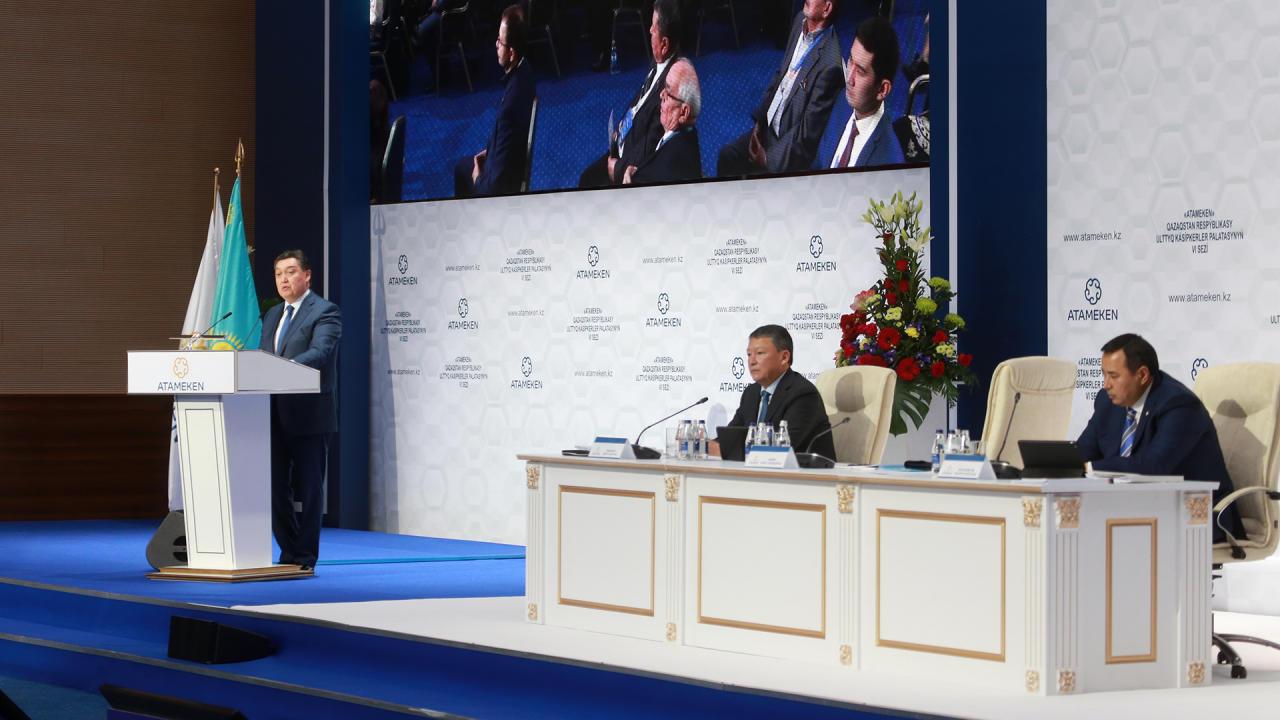Kazakhstan set to increase volume of SMEs - prime minister

By Abdul Kerimkhanov
Kazakhstan aims to increase the number of people employed in small and medium-sized businesses (SMEs) in the country.
Today, over 30 percent of Kazakhstan’s population are employed in SMEs and the share of SMEs in the economy is 28.5 percent, Prime Minister Askar Mamin said during the 6th Congress of the Atameken National Chamber of Entrepreneurs.
Amin said that the government has been assigned “the strategic task of bringing this indicator to 35 percent in 2025 and to 50 percent by 2050. For this, a set of systemic and structural measures is being taken."
“The government and Atameken [National chamber of entrepreneurs of Kazakhstan] are closely cooperating for the effective implementation of the strategic objectives set by [former president] Nursultan Nazarbayev and President Kassym-Jomart Tokayev to ensure high-quality economic growth and increase the welfare of Kazakhstanis,” Mamin said.
As was noted, the manufacturing industry, fuel and energy, agro-industrial complexes, tourism, transport and logistics have great potential for attracting investment.
“We urge domestic business to take an active part in these processes and strive to create attractive conditions for both Kazakh and foreign investors,” Mamin stressed.
Mamin noted that over the years of the implementation of the Business Road Map 2020 State Program, over 14,000 projects for a total loan amount of 2.5 trillion tenges ($6.47 billion) were subsidized, the total amount of subsidies paid exceeded 240 billion tenges ($620.8 million).
“Given the high efficiency of the state program, the period of its implementation will be extended until 2025,” said Mamin.
He called increasing export of non-primary goods with higher added value as the most important task. For these purposes, 500 billion tenges ($1.3 billion) was allocated for the next three years. Seven product groups for export diversification were identified.
“The government will do everything possible to create one of the most favorable conditions for doing business in Kazakhstan. We will continue to work to further improve the business environment,” said Mamin.
Kazakhstan’s position in the World Bank's Doing Business ranking has been increased to 25th place recently. In order to further improve the business climate, the 8th package of legislative initiatives is being developed. It aims to further simplify the procedures for opening bank accounts, registering enterprises, including as a VAT payer, as well as strengthening the protection of minority shareholders.
The principles of the “presumption of good faith of entrepreneurs” will be laid down by law. All uncertainties and issues unresolved by applicable law will be interpreted in favor of the business entity. A “transitional period" is envisaged in relation to norms imposing additional obligations on business and citizens.
As part of the implementation of the five social initiatives of ex-president Nazarbayev, about 24,000 microloans have been issued in the country. As a result, more than 22,000 people were provided with work. Under the Bastau-Business project, over 88,000 people have been trained in the basics of doing business in three years. Short-term vocational training will additionally cover about 300,000 people.
Mamin emphasized that the development of local content is under special control, measures are being taken to protect the domestic market from unsafe and poor-quality products, the functionality of the Project Office of the Economy of Simple Things has been expanded, and 10 priority commodity groups for import substitution have been identified.
“This will ensure a reduction in imports by about $5 billion, reduction of import inflation and interest rates on loans. The government will provide the entire package of necessary support measures for such projects,” Mamin said.
The development of entrepreneurship is largely regional in nature. In this regard, the Kazakh Government jointly with Atameken conducted a country screening to determine growth points in the regions. To date, about 1.8 million respondent data have already been uploaded to the system. The survey is conducted in 6,000 settlements across Kazakhstan. As a result, state support measures will be developed "at the level of districts and rural districts."
---
Abdul Kerimkhanov is AzerNews’ staff journalist, follow him on Twitter: @AbdulKerim94
Follow us on Twitter @AzerNewsAz
Here we are to serve you with news right now. It does not cost much, but worth your attention.
Choose to support open, independent, quality journalism and subscribe on a monthly basis.
By subscribing to our online newspaper, you can have full digital access to all news, analysis, and much more.
You can also follow AzerNEWS on Twitter @AzerNewsAz or Facebook @AzerNewsNewspaper
Thank you!
